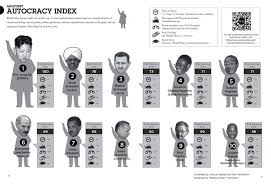
记忆方法
记忆“autocracy”这个单词,可以将其分解为两个部分:“auto”和“-ocracy”。将“auto”理解为“自己”(self)的简化形式,而“-ocracy”是“统治”(rule)的后缀。组合起来,可以想象成一个国家由“自己”(self)统治,即由一个人或一小撮人独裁统治,这样就记住了“autocracy”这个表示“独裁统治”或“专制政权”的单词。
以上内容由AI生成, 仅供参考和借鉴
中文词源
autocracy 独裁政体
前缀auto-, 自己的。词根cracy, 管理。
英语词源
- autocracy (n.)
- 1650s, "independent power, self-sustained power," from French autocratie, from Greek autokrateia "ruling by oneself," noun of state from autokrates (see autocrat). Meaning "absolute government, supreme political power" is recorded from 1855.
权威例句
- 1. The revolution caused the overthrow of the autocracy.
- 这场革命导致了独裁政体的结束.
- 2. She ceded all power to her son-in-law who now runs the country as an autocracy.
- 她把权力全部交给自己的女婿,他现在对国家实行独裁统治。
- 3. Many poor countries are abandoning autocracy.
- 很多贫穷国家都在放弃独裁统治。
- 4. There is no sanction for autocracy.
- 没有人赞成独裁统治.
- 5. His articles aroused the anger and indignation of the popular masses against the tsarist autocracy.
- 他的文章唤起民众对沙皇独裁的愤慨.